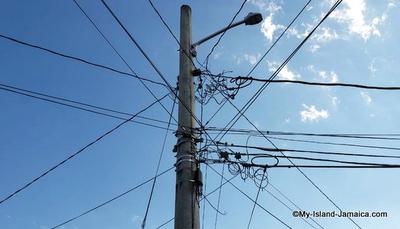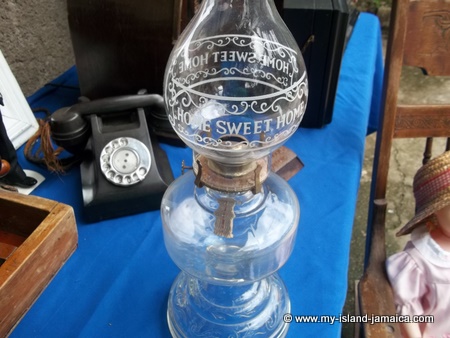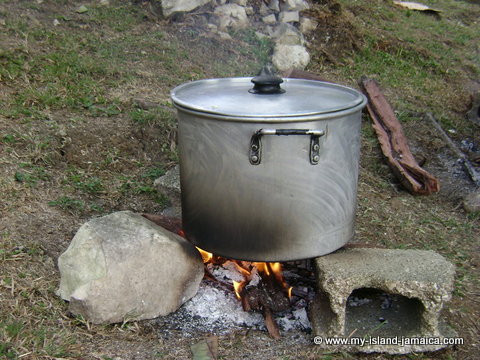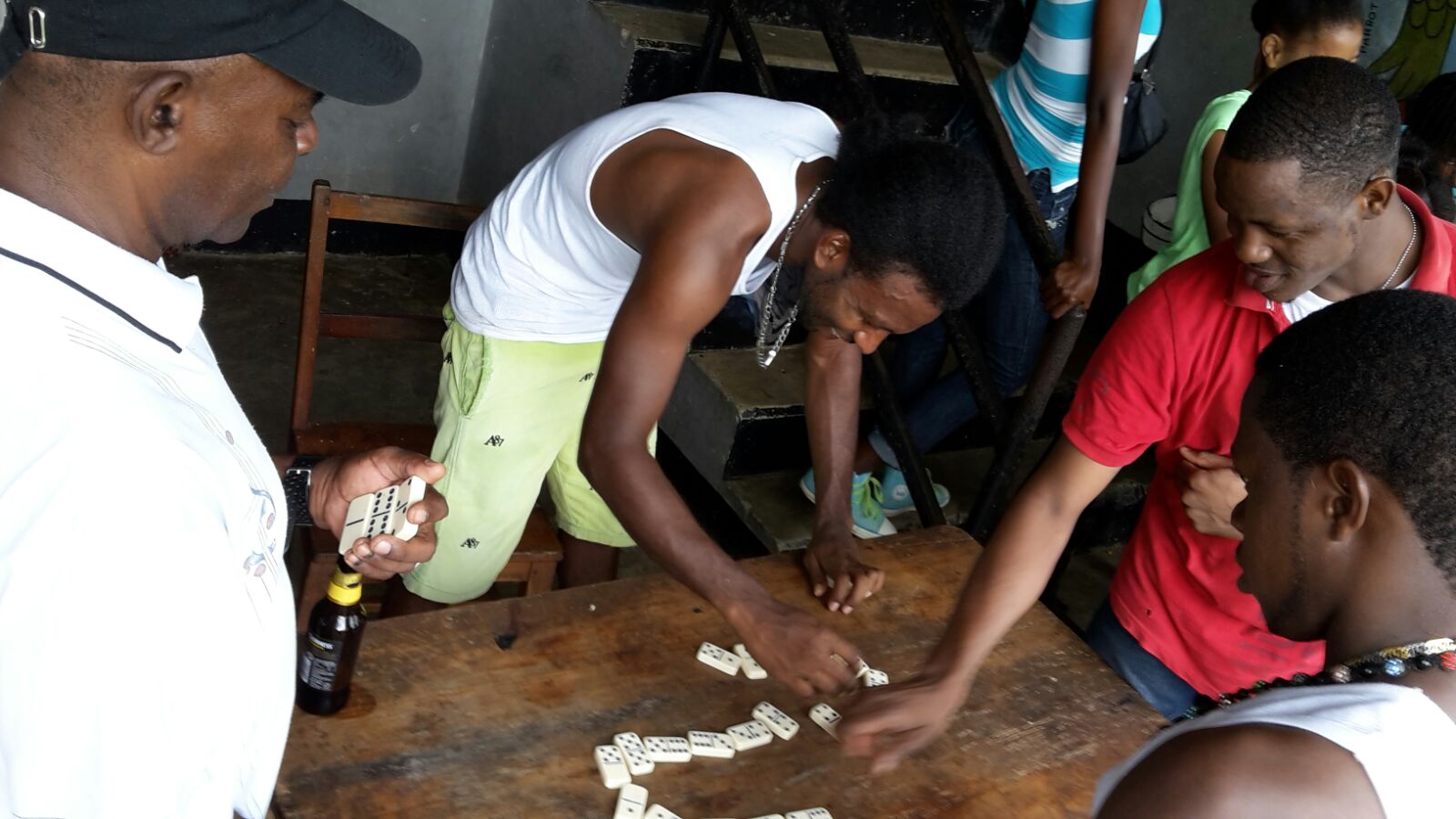Subscribe for all my updates and don't miss a thing! Sign me up!
What Did Jamaicans Do Before Electricity?
by Sheree-Anita Shearer | Associate Writer

Photo: Electricity Pole
It is hard to believe that there was a point in history when the light was not available just by the flip of a switch.
Now almost every household in Jamaica has its electricity provided thanks to the Jamaica Public Service Company Limited.
But before JPS came around, just how did Jamaicans of that time, do basic tasks like cook, travel or even just get an ice-cold beverage from the fridge?
House Chores
- Lighting

Photo: Home Sweet Home Lamp Shade
There were no bulbs or electric lamps. Kerosene lamps or candles were used to light the home at night. The famous Home Sweet Home shade could be found in every home in Jamaica. Rural shops used small tin lamps called tilly lamps as well as lanterns utilizing methylated spirits or kerosene oil (a mainstay) in those times. - Cooking

Photo: Wood Fire
I know now most people have a gas or electric stove now but before electricity, there were only kerosene run stoves. Outside of that, all the cooking was done on a fire made outside. - Refrigeration
Back in these times, a fridge was a luxury, not many people had them. They were run on kerosene just as the stoves were. Persons with fridges would make ice and those who didn’t have a fridge would purchase bags of ice from their neighbors.
In those days ice factories were of major importance and could be found in places like Santa Cruz, St. Elizabeth, Dean's Valley, Westmoreland and Falmouth, Trelawny.
You could go there to purchase ice. However, it was mostly loaded onto trucks that drove to specific stops to retail it to persons, who would travel many miles to line up and buy the precious commodity to load it onto their donkeys.
The miracle and skill of ice preservation was put on show to get back home as the ice rested in a bag filled with sawdust in which a well was created that was lined with dried banana leaves and the block of ice ranging from 25 pounds up would nestle within and placed in hampers. Shop operators would further resell the ice to their communities.
My mom would walk about two miles to buy ice in a small igloo for the family, especially on Sundays to put in the carrot juice being served with dinner. Her grandmother had a kerosene fridge which made life easier.
My mom says meats were mainly cured for preservation and treats such as ice cream was when the ice cream man rode through the area or my granddad travelled to Savanna-la-mar some 25 miles away he would wrap it thickly with newspapers, place it in another container and take it home. - Washing
Even today it isn’t commonplace for people to wash by hand instead of with a washing machine. Some Jamaicans believe hand washing is way better than washing with a machine and will still wash the clothes a little bit by hand before putting them in the machine. - Water Heating
Water heating isn’t something my grandmother had just by flipping a switch or turning on a pipe like we do today. On those cold mornings, they would have to get up and make a fire to boil the water before bathing. - Standby generators
When generators came in, they were used to operate the refrigerators and TVs for those who had them. Such equipment was rare in a community.
Entertainment
No electricity means no TV, computer, phone or any other device for that matter. So just how did they entertain themselves? If you had a TV, neighbours and family would converge on the house in the evenings to watch the news and major events such as a boxing match. It was like a movie theatre.
Otherwise, people would spend a lot more time than we do now enjoying the great outdoors. Children would run through the hills together, play copious rounds of cricket, football, marbles or whatever the game of choice was that day.

Photo: Jamaican men enjoying a game of dominoes
The adults would gather around for dominoes or have long heated debates about everything and nothing. A battery-operated radio was also very important not just for music but to hear the news. There were even TVs that used batteries.
There were many community engagements to attend so nobody was ever bored.
Communication
Nowadays, talking to family members no matter how far-flung they are across the globe can happen within a matter of seconds. We are so fortunate now that we can talk to loved ones in multiple parts of the world all at once. But before the invention of cellphones and smart devices what were Jamaicans doing to communicate?
They would have to send letters to their loved ones via the post office. Or go visit them if that was possible, there was no other way. My grandmother says sometimes, the letters would get lost in the mail or the person would receive the letter too late.
It was very common for persons abroad to miss weddings and funerals because they got the message after the fact. Or they would turn up and no one would know they were coming because they had not received the letter in time.
For emergency communications, a telegram had to be sent. That meant travelling to the next major town as the local post office couldn't assist with that.
Travel
Travelling especially at night was something you had to prepare for. Bottle lamps were often used for travelling after dark. This was made from a glass bottle filled with kerosene oil with a tightly wounded roll of newspaper or brown paper.
The newspaper or brown paper was then snugly placed into the bottle opening and then lit. Whenever the light dimmed, a slight tilt of the bottle allowed the kerosene to get to the paper again. Experts maintained an even tilt as they carried their touches and the light never dimmed. Sounds complicated, doesn’t it? Well just pray that it isn't a windy night or worse, a rainy one. For short distances, a firestick was removed from the fire and used to light the way. After a while flashlights became popular.
I also recommend you read, Electricity in Jamaica.
Regards,
SS
Editor's Note
Share your thoughts and comments here!.
New! Get My Latest Book👇🏿
|
You asked, I've answered! You no longer need to save for months or years, to enjoy paradise! I spilled the beans! sharing my top tips on finding cozy accommodations and secret gems, only the way a native could! Click Here to pick it up on my e-store and start saving now! |
See The Best Of Jamaica - In Videos!
|
My channel reaches over 140,000 subscribers worldwide and has leveraged over 11 million views, sharing, what I call 'The Real Jamaica'. Subscribe today and join our family of viewers. |
Read More ...
New! Experience The REAL Jamaica!
Book Your Private Tour here and experience Jamaica the way we (locals) do!
P.S. Didn't find what you were looking for?
Still need help?
Click Here to try our dependable and effective Site Search tool. It works!
Or, simply click here and here, to browse my library of over 500 questions and answers! Chances are someone already asked (and got an answer to) your question.









